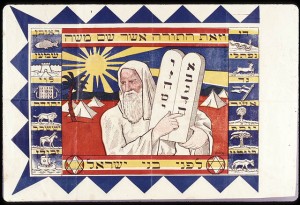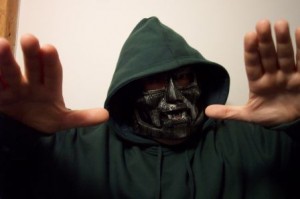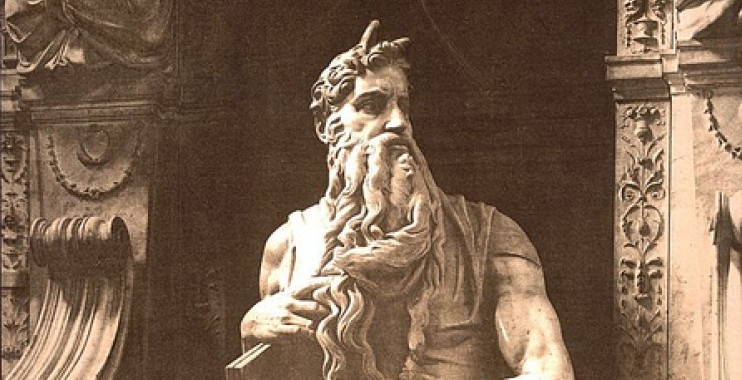by Tom Bair
I
I’ve decided to read the bible cover to cover, not because I am any more or less a Christian than I was at the start of the year, but because sections of this book have been read and reread for over two thousand years by three world religions, and If I am going to seriously enter into conversation with the status of the social and political world I encounter, this seems like a mandatory step. Perhaps these readings will elucidate nothing. I am okay with that possibility. Someday I’ll write more about this decision and religion in broader sweeps. Today I have business to which I’d like to attend.
Exodus is the story of the Israelites’s deliverance from the bondage of Egypt’s Pharaoh. As far as I can tell, this story is still the most recurring example of slavery in the modern mind, except, of course, for the American version. There is little in common between the two.
Spoiler Alert, Exodus: Toward the end of Genesis, the Israelites move into Egypt of their own accord, famine being in the land of Canaan, and Josef, the Israelite, dwelling bounteously in Egypt. Exodus begins with the Israelites prospering a bit too much; the Pharaoh of Egypt grows nervous and puts them to work. Later, this Pharaoh dies, and the Israelites are now stuck in a land that isn’t theirs with a ruler who doesn’t even remember Josef. Still, the Israelites thrive and thus the Pharaoh is maddened. His decree is that all of the first born sons of the Israelites will be killed. Moses is saved, sent down a body of water in a little baby-raft, and eventually raised by the very daughter of the Pharaoh.
In his adolescence Moses sees the burden of his people. How he comes to know he is an Israelite is not clear. Still, Moses watches an Egyptian whipping two Israelites and then kills the Egyptian. Pharaoh discovers this, and Moses flees. The rest is biblical history: Burning Bush, Let My People Go, Plagues, Red Sea, Ten Commandments, Forty Years of Wilderness. That Exodus has come to mean simply a heroic act of removal is important. 
The Trans-Atlantic Slave Trade was big business; the likes of Karl Marx refer to the trade of Africans as the rosy dawn of capitalism. The Trans-Atlantic Slave Trade knew at least four centuries and three continents. The effects of this movement were indeed so vast that one cannot really call it “The American Story” without noting that they’re leaving a bunch of stuff out. I’m leaving a bunch of stuff out. (This also points to the differences between an academic history and a religious history. Religious histories, it seems, get to the point. In academic histories we stew in the complexity of the situation.)
Africans were billed as sub-human, and bought and sold like the cotton they produced. They were brought to America’s famously fertile South as a source of labor; raw materials were made in America and shipped to Europe for further production.
What is the point of my recounting all of these details? Do I assume that you haven’t had any basic history lessons? Why am I interested in these things?
II
I wasn’t born in a church but I tell people I was born in a church because people make such wonderful faces. Truth: I was born in St. Vincent’s. I did, though, live in the rectory of the Church of the Transfiguration for the first four and a half years of my life. Then my parents moved to a very cool house a mile’s distance from the Shawangunk Ridge in New Paltz. We had a cemetery in our back yard, and a dutch door facing the road that opened into the basement. But alas, the American Dream, my father was an actor acting as a businessman, my mother was in the often impossible predicament of womanhood (manhood is also often impossible). They were crazy for one another and then crazy by one another; when I was eight I moved South along the Hudson (with my mother, a teacher), into The Newburgh Enlarged City School District.
Newburgh is a small city. It housed George Washington’s headquarters during the revolution, maintained a booming theater presence in the nineteenth and early-twentieth centuries, and was one of the Hudson’s industrial hubs during those years. But we know where the story of industry goes: elsewhere. Newburgh, like so many upstate cities, began an economic downward spiral during the twentieth century when industry found cheaper sources of labor in other places. Since then it’s been one thing after the other: Urban Development, Crack, etc. The 2000 Census has Newburgh at 42 percent white, 32 percent black, 36 percent Hispanic. A quarter of the population lives below the poverty line, a third of people 18-35 live below the poverty line.
Personal matters, if you’ve ever had personal matters I’m sure you’ll agree, don’t clarify anything.
None of the above means anything in particular about me. I’m stating my personal origins only as an invocation to begin talking about some things that deserve attention, a few topics that need a specific hand to get on their feet. (Also, it feels lovely to repeat oneself.)
In The Light of Trayvon, a seventeen year old with a bag of skittles, someone whom
I’m still going to take the long way around.
III
Notice how many verses in Genesis are devoted to the listing of names, pointing to the origins of a group of people. That Adam and Eve could not possibly have been the first two humans is irrelevant. One of the things that makes the bible a very tricky book is that it places traditional myths, like creation stories, moments of divine influence, and moral parables (stuff that is meant to be infallible) side to side with the history of a people, the people’s laws, the people’s customs, the people’s attitudes. Genesis was written during a moment when Gods were in competition for followers. Note in Exodus, one book later, God’s first Commandment: Thou shall have no other Gods before me. This tactic of naming names alongside statutes of belief and statutes action is note-worthy. The tandem approaches simultaneously unite and divide “us” from “them,” and define what “us” means.
I’ve hinted that aside from our own America’s history, this Book of Exodus is the prevailing example of slavery in the common veins. But if the Book of Exodus seeks to provide guidance beyond merely the attitude one must adopt in the face of very blatant, open oppression, the lack of similarities between America the Master and Egypt the Master confound the physical remedies greatly.
A few mismatched notes:
The Newburgh Enlarged City School District in an anomaly insofar as
So I get to Newburgh and suddenly I’m not as white as I was once. Whatever that means. But by the time I’m thirteen it’s, like, something I’m hearing about at family gatherings: Tom, why are you acting black?
I’m trying to confuse myself, and I’m trying to ask for a pardon for talking about the things I am going to talk about. Also, there is something very persuading in repeating this sort of thing, especially before beginning something new. Somehow by repeating myself I am allowed to be on one hand much more focused, on the other as ambitious as I’d like to be.
Rap talks about capital and makes capital.
the technology that engineers domination arises from the ethos of domination is not a good formula
Capital thrives on easily markable signs
What’s more easily markable?
IV
So the slaves in America have no Exodus, no extrication, of which we can easily speak. Lincoln, a far cry from Moses, is mostly concerned with preserving the Union when he signs the Emancipation Proclamation. The slaves are freed into war, Sherman promises reparations, Johnson reneges.
But this thing that happened, the slavery without an Exodus, this is, without question, a special American condition.
V
How could swaths of Christians, knowing what they knew, namely the Book of Exodus, take slaves?
“’If God doesn’t exist, the father says, then everything is permitted.’ Quite evidently, a naïve notion, for we analysts know full well that if God doesn’t exist, then nothing at all is permitted any longer. Neurotics prove that to us every day. ” –Lacan
Also ask Frederick Douglas, Kafka, and Dostoevsky about how The Master is maimed.
So let’s say, for instance, that a nation born of a belief in capital takes a people and deprives them totally of capital but also makes them capital.
Who then blames Jay-Z or Wayne when they sing: “I never prayed to God I prayed to Gotti,” or, “If I don’t do nuthin Imma ball.”
And what of the codification of behavior in light of these things? What does it mean to “act white” or “act black?”
I know a third wave feminist, a friend of mine, who told a student of hers, a friend of mine, to stop acting black because he raps.
If we’re all Trayvon, and the mark of Trayvon is the hoody, what does it mean that a hoody can be purchased?
Or that the hoody, by definition, conceals?
If there is an American Exodus it doesn’t look like anything.
look






